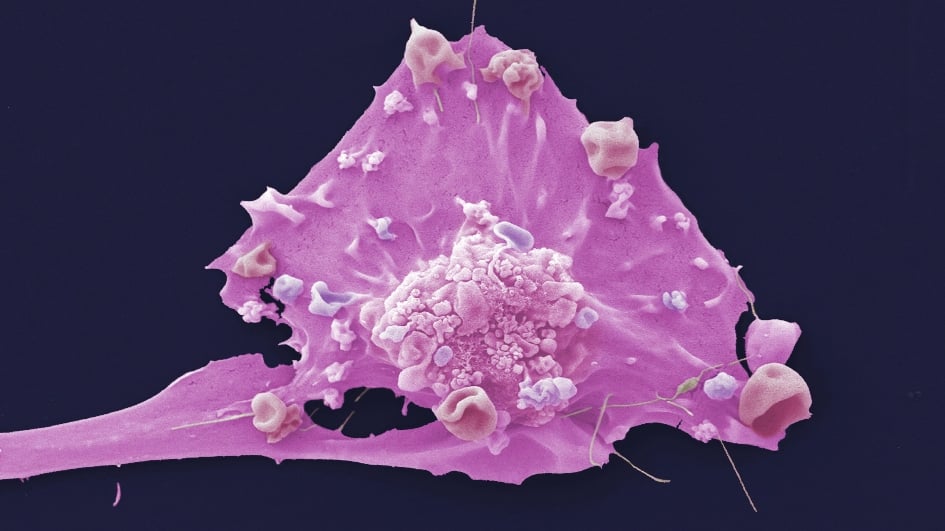
Image: Breast cancer cell.
One year of treatment with the targeted drug olaparib improves long-term survival in women with high-risk, early-stage breast cancer with mutations in BRCA1 or BRCA2 genes, new results from a major clinical trial show.
Ten years since the first patient was recruited, new findings from the phase III OlympiA trial – presented at San Antonio Breast Cancer Symposium (SABCS) 2024 – show that adding olaparib to standard treatment cuts the risk of cancer coming back by 35 per cent, and the risk of women dying by 28 per cent.
After six years, 87.5 per cent of patients who were treated with the drug were still alive compared with 83.2 per cent of those who were given the placebo pills.
Professor Andrew Tutt at The Institute of Cancer Research, London, and King’s College London is the global lead investigator and Chair of the Steering Committee for the OlympiA study, and was also involved in early laboratory research on PARP inhibitors such as olaparib, and their subsequent clinical development. The Breast International Group (BIG) coordinated the international OlympiA study, involving 671 study locations, globally across multiple partners. BIG coordinated the trial’s UK sites through the ICR Clinical Trials and Statistics Unit (ICR-CTSU).
OlympiA trial researchers studied 1,836 women with HER-2 negative breast cancer, who also had a mutation in their BRCA1 or BRCA2 genes and had undergone standard treatment, including surgery and chemotherapy. Patients were randomly allocated to receive either 300mg twice a day of olaparib or a placebo drug for one year.
The trial has led to NICE recommendation
Earlier results from the OlympiA trial led to the recommendation by NICE to grant people in England and Wales with early-stage, high-risk breast cancer and inherited mutations in BRCA1 or BRCA2 access to olaparib following standard treatment – helping prevent their cancer returning and improving their chances of survival.
The latest results – released 10 years after the trial began recruitment – show that olaparib successfully keeps cancer at bay in the long-term and reinforces the importance of BRCA testing at cancer diagnosis, so that patients who may benefit from olaparib treatment can be identified as early as possible.
Inherited mutations in the BRCA1 or BRCA2 genes account for five per cent of all breast cancers. Women with early-stage breast cancer who have inherited BRCA1 or BRCA2 mutations are typically diagnosed at a younger age and often require more intensive treatment. Olaparib targets the specific biology of the BRCA genes, killing cancer cells while leaving healthy cells alone.
The ICR's role in the development of olaparib
The ICR has played a crucial role in the development of olaparib. ICR scientists were the first to demonstrate that cancer cells with mutations in BRCA1 or BRCA2 were highly susceptible to PARP inhibitors like olaparib.
Clinical trials of olaparib, led by researchers from the ICR and The Royal Marsden NHS Foundation Trust, then showed that olaparib was effective for patients with a range of cancers associated with BRCA1 or BRCA2 mutations, including ovarian, prostate and breast cancer.
OlympiA steering committee chair Professor Andrew Tutt, Professor of Oncology at The Institute of Cancer Research, London, and King’s College London said:
“These results are great news for many women with inherited breast cancer, showing that olaparib treatment will significantly reduce their chance of life-threatening recurrence and cancer spread, years after treatment.
“For women with inherited mutations in their BRCA1 or BRCA2 genes, and triple negative or hormone receptor positive breast cancer, olaparib exploits the weaknesses in their cancer.
“The OlympiA trial has shown the importance of genetic testing for women diagnosed with early-stage breast cancer, to identify cancers with BRCA1 and BRCA2 mutations so that we can determine who can benefit from this personalised treatment approach.”
The results 'provide hope'
Professor Kristian Helin, Chief Executive of The Institute of Cancer Research, London, said:
“The results from the OlympiA trial continue to provide hope and reassurance to women with early-stage, high-risk breast cancer. Olaparib has major benefits for this group of patients, increasing their chances of remaining cancer free in the long-term and potentially being cured after initial treatment.
“We are thrilled that patients can receive the drug on the NHS following the momentous recommendation by NICE last year, and I’m proud of the pivotal role that the ICR’s scientists played in olaparib’s development. Olaparib was the first cancer drug in the world to target inherited genetic faults. This began as a fundamental discovery about a weakness in cells with mutations to the BRCA genes, with ICR scientists identifying how to target that weakness, all the way through to the completion of the phase III clinical trials. Today’s announcement confirms the success of olaparib in the longer-term, keeping more women free of disease and alive and well, long after their initial treatment.”
David Cameron, Breast International Group Chair, OlympiA co-principal investigator, and Professor of Oncology at Edinburgh University, said:
“On behalf of the Breast International Group, and the other partners in this global trial, I am delighted to see that longer follow-up has confirmed the survival gain from one year of the PARPi olaparib in patients with high-risk breast cancer developed on a background of a germline mutation in the BRCA1 and/or BRCA2 genes. These results are testament to the benefits of a global academic-pharmaceutical company partnership."
Susan Galbraith, Executive Vice President, Oncology R&D, AstraZeneca, said:
“Two years ago, olaparib became the first and only PARP inhibitor to demonstrate a survival benefit in germline BRCA-mutated, HER2-negative and high-risk early-stage breast cancer. To see this benefit continue at six years of follow-up is tremendous for patients and reinforces how olaparib is continuing to transform the treatment of BRCA-mutated early-stage breast cancer.”
